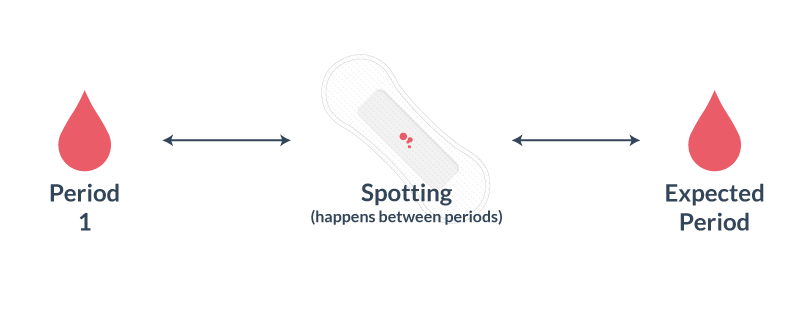Any type of unexpected blood can be scary, but it is important to manage your fear and assess the situation. There could be many reasons for your spotting between periods, and just because you are bleeding does not necessarily mean there is a problem. In fact, most women experience this at some point in their lives. So, let us explore the reasons why you may be spotting before and after periods.

Spotting due to ovulation
If possible, take note of when the spotting occurs. About 10% of women will experience some kind of spotting during ovulation. This is due to a temporary drop in estrogen when the egg is released, and it is completely normal. If you are spotting from ovulation, you may also experience some light cramping, and the small amount of blood you see may be mixed with vaginal discharge. See our infographic on signs of ovulation.
Spotting before your period
It is also normal for many women to experience spotting as a first symptom of their menstrual period. This does not necessarily mean that spotting always occurs for these women before their period, but it is not abnormal for a woman to have an unusual cycle due to stress or outside factors. Such an unusual cycle could cause spotting to occur up to three days before a woman is due for her regular period. It may also occur up to a week after her period for the same reason.
Spotting during pregnancy
Many women experience spotting in the first trimester of pregnancy, so if you are in the stage between ovulation and your menstrual period, there is a chance you may be pregnant. During the first few days of pregnancy, it is very common for women to experience some form of spotting as the fertilized egg attaches to the uterine wall, this is known as implantation bleeding. This occurs so early in pregnancy that most women do not even realize they are pregnant yet.
Spotting during perimenopause
As your body transitions to not having periods any longer, it is common to experience spotting between periods. Still, if you think your spotting is due to perimenopause, you should consult your doctor. He or she can rule out other possible causes of your spotting and help you through the process.
When to see a doctor
There is an important distinction between spotting and heavy bleeding.
Spotting is light bleeding that lasts for about three days or less. If you are experiencing spotting or bleeding that goes on for a week or more, and it is not your period, you should schedule an appointment with your doctor. Also, if you are noticing a pattern of bleeding or spotting between periods, consult with your doctor. If you are experiencing heavy bleeding for any reason, especially after sex, be sure to get it checked out. These things may have simple explanations, but your doctor can rule out more serious possibilities.
Logging spotting in your daily log
If you're using Ovulation Calculator to help you get pregnant, keep a log of any days you see spotting in your daily log. Note: You can only add spotting on days that you haven't marked as period days.







